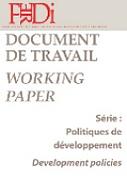A Global Financing Pact for Poor and Vulnerable Countries?
October 22, 2024





Dama A-A., Dequiedt V., de Ubeda A-A. & Rota-Graziosi G. (2023) "Taxation of civil aviation fuels as a source of financing for vulnerable countries", FERDI Working Paper P318, March.



